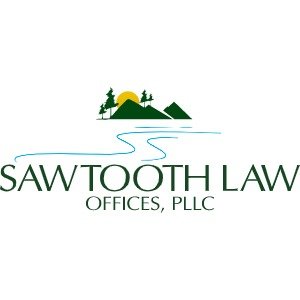Best Creditor Lawyers in Twin Falls
Share your needs with us, get contacted by law firms.
Free. Takes 2 min.
List of the best lawyers in Twin Falls, United States
About Creditor Law in Twin Falls, United States
Creditor law in Twin Falls, United States, refers to the legal framework that governs the rights and obligations of individuals or organizations who lend money or extend credit to others. This area of law involves various aspects, including debt collection, loan agreements, bankruptcy, and consumer protection. Understanding creditor law can help individuals and businesses navigate financial transactions and resolve disputes effectively.
Why You May Need a Lawyer
There are several situations where seeking legal help from a lawyer experienced in creditor law in Twin Falls may be essential. Some common scenarios include:
- If you need assistance drafting or reviewing loan agreements or credit contracts to ensure legal compliance.
- If you are facing debt collection efforts or have been sued by a creditor.
- If you are considering filing for bankruptcy and need guidance on the process and potential implications.
- If you believe a creditor has violated your rights or engaged in unfair lending practices.
- If you need legal advice on debt consolidation, asset protection, or credit repair.
Local Laws Overview
When dealing with creditor matters in Twin Falls, it's important to understand the relevant local laws. Some key aspects of the local laws that may be particularly relevant include:
- State-specific regulations for debt collection practices, including restrictions on harassment and unfair collection methods.
- Laws governing the enforcement of loan agreements, such as statutes of limitations and requirements for written contracts.
- Consumer protection statutes aimed at preventing deceptive lending practices and ensuring fair treatment of borrowers.
- Bankruptcy laws, including eligibility criteria, exemptions, and the different types of bankruptcy filings.
Frequently Asked Questions
1. Can a creditor garnish my wages in Twin Falls?
Yes, under certain circumstances, a creditor may be able to garnish your wages in Twin Falls. However, there are limits on the amount that can be garnished, and you may have grounds to challenge the garnishment.
2. How long does a creditor have to sue for a debt in Twin Falls?
In Twin Falls, the statute of limitations for filing a lawsuit to collect a debt varies depending on the type of debt. Generally, it ranges from 4 to 6 years, starting from the date the debt became due.
3. Can a creditor repossess my property without notice?
No, creditors typically cannot repossess your property without providing prior notice and an opportunity to cure the default. However, specific requirements may vary based on the type of property and the terms of your agreement with the creditor.
4. What are my rights if a creditor violates the Fair Debt Collection Practices Act (FDCPA)?
If a creditor violates the FDCPA, you have the right to take legal action against them. You may be entitled to damages and the recovery of attorney fees if you can prove the violation.
5. Can I discharge my debts through bankruptcy in Twin Falls?
Yes, bankruptcy can provide a way to discharge or restructure your debts in Twin Falls. However, the eligibility criteria and the process can be complex, and it's crucial to seek legal advice to understand the specific implications for your situation.
Additional Resources
If you need further information or assistance with creditor matters in Twin Falls, the following resources may be helpful:
- Twin Falls County Bar Association - Provides a directory of local attorneys specialized in various areas, including creditor law.
- Idaho Legal Aid Services - Offers free legal assistance to eligible individuals facing creditor-related issues.
- Idaho Department of Finance - Regulates creditors and provides information on consumer rights and financial fraud prevention.
Next Steps
If you are in need of legal assistance regarding creditor matters in Twin Falls, consider taking the following steps:
- Identify your specific issue or concern related to creditor law.
- Research and gather relevant documentation, such as loan agreements, collection letters, or bankruptcy records.
- Consult with a qualified attorney specializing in creditor law to discuss your situation and explore your legal options.
- Work closely with your attorney to develop a strategy and take appropriate action to address your creditor-related matter.
- Keep records of all interactions, payments, and correspondence related to your case for future reference.
Lawzana helps you find the best lawyers and law firms in Twin Falls through a curated and pre-screened list of qualified legal professionals. Our platform offers rankings and detailed profiles of attorneys and law firms, allowing you to compare based on practice areas, including Creditor, experience, and client feedback.
Each profile includes a description of the firm's areas of practice, client reviews, team members and partners, year of establishment, spoken languages, office locations, contact information, social media presence, and any published articles or resources. Most firms on our platform speak English and are experienced in both local and international legal matters.
Get a quote from top-rated law firms in Twin Falls, United States — quickly, securely, and without unnecessary hassle.
Disclaimer:
The information provided on this page is for general informational purposes only and does not constitute legal advice. While we strive to ensure the accuracy and relevance of the content, legal information may change over time, and interpretations of the law can vary. You should always consult with a qualified legal professional for advice specific to your situation.
We disclaim all liability for actions taken or not taken based on the content of this page. If you believe any information is incorrect or outdated, please contact us, and we will review and update it where appropriate.








